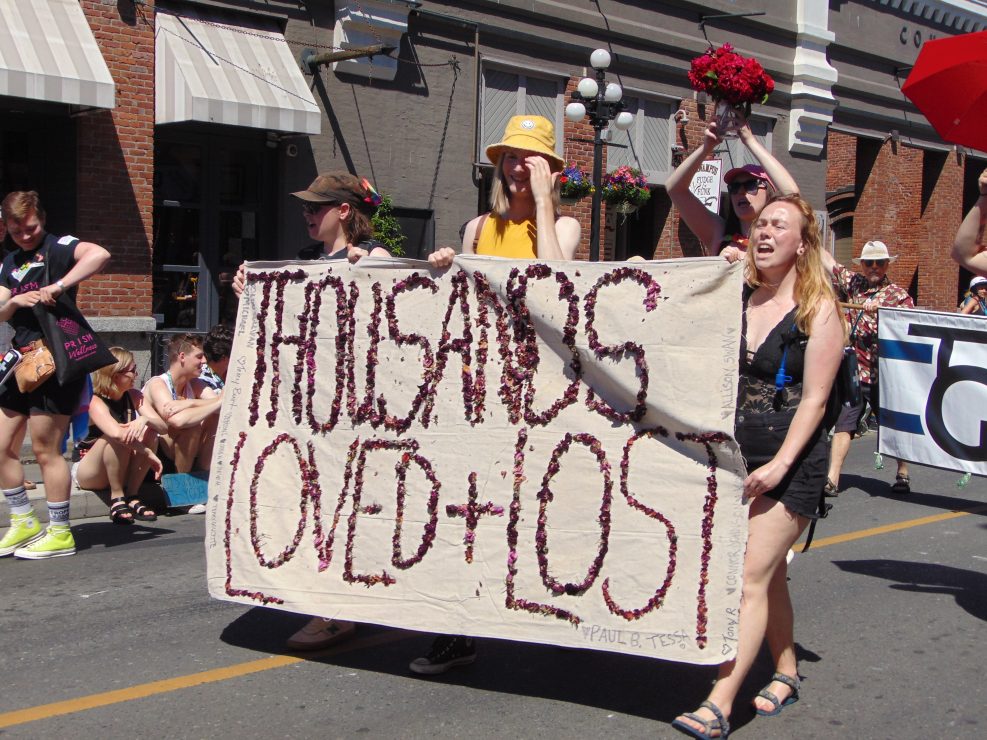Hate trends continued to escalate across Canada through Pride Month — here’s what you need to know

Photo by Sie Douglas-Fish.
CW: This article discusses violence against the LGBTQ2S+ community.
Another Pride Month has come and gone, but not before The Human Rights Campaign issued a state of emergency for LGBTQ2S+ people in America. The state of emergency followed on the heels of a string of anti-trans and -queer legislation across America — hot topics that have been dominating Canadian news for months.
The problem, however, is not unique to our southern neighbours. Here’s a (far from comprehensive) look at the recent state of things here in Canada.
Uptick in hate-motivated crimes across the country
Hate-motivated crimes in Canada rose 27 per cent in 2021 according to Stats Canada, which also tracked a 64 per cent increase in hate crimes targeted towards LGBTQ2S+ individuals. In a speech on June 8, Prime Minister Justin Trudeau warned Canadians about the rise in LGBTQ2S+ hate across the country.
This year’s slew of events hasn’t been isolated to Pride month either. In February, a billboard in West Kelowna featuring a stern-looking woman in front of a Progress Pride flag asked highway drivers “What are your kids really learning in schools?” Advocates linked the billboard to the drag story time protests that took place in Kelowna in late January.
During Toronto’s Pride Parade in June, Kensington Market’s queer-operated sex shop co-operative, Come As You Are, had their front window smashed. In an Instagram statement, they shared that they had reason to believe the act was hate-motivated.
June closed off with a widely-publicized hate-motivated stabbing at a University of Waterloo gender studies class.
“We want to state unequivocally that the University of Victoria believes that everyone should have the freedom to live their lives authentically,” read a statement from UVic in response to the event. “We must care for one another, and the university is committed to making our campus safe and inclusive.”
In an emailed statement to the Martlet, Lane O’Hara Cooke, UVSS director of outreach and university relations, shared her own concerns about what these trends mean for Victoria.
“Homo antagonism and trans antagonism can be difficult to pinpoint in ‘liberal/progressive’ cities … because it often lives beneath the surface,” she said. “It may present in covert, rather than overt ways.
“Queer and trans people are at a higher risk of violence as well as struggling with mental health issues … I mean it when I say that isolation kills.”
Divisive policies present barriers to inclusive education
This year’s Pride celebrations were peppered with discourse around the issue of queer-inclusive education in public schools.
In Newfoundland, a St. John’s school received backlash for hosting Pride events, sparking protests and counter-protests between queer advocates and anti-queer groups.
Controversy around New Brunswick’s changes to Policy 713, which gives educators the choice of whether or not to respect students’ choice of pronouns, continued into June. The province’s premier cited what he sees as the “erosion of the family role in children’s upbringing” as the motivation behind the changes.
Trans youth are disproportionately impacted
On June 1, B.C. Conservative candidate Karin Litzcke called for a “ban on biological men participating in women and girls’ competitive sports” following statements she made online that were deemed transphobic by advocates.
Her statements addressed an incident at an Okanagan elementary school track meet where a nine-year-old girl was subject to a verbal attack by parents questioning her gender identity.
Research from the B.C. Representative for Children and Youth’s office found significantly higher rates of suicide attempts and ideation among trans and Two-Spirit youth compared to their cisgender peers, leading to a report containing eight recommendations for government ministries.
It’s happening in our community, too
“From the violent threats received by a family-friendly drag show last June … to transphobic graffiti written on the bathroom stalls of our buildings, overt animosity and hostility towards the queer and trans community is still a threat to our campus,” Cooke said.
For example, a July 1 Instagram post by UVic shouting out the university’s Trans+ archives attracted a slew of transphobic comments, including demands for a Canada Day post.
“Queer, trans, and Two-Spirit people, especially if they hold multiple marginalized identities, are more likely to experience food and housing insecurity, sexualized violence, addiction and mental health issues, and hostility and discrimination,” Cooke said, adding that the UVSS operates supports like the Peer Support Centre and the Anti-Violence Project to mitigate this damage.
“I hope this sparks a fire within our community to come together,” she said. “We are better at caring and advocating for each other when we shift our thinking from an individualist model to a collectivist one. We cannot eat our own, that’s not how work gets done.”







